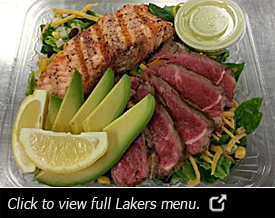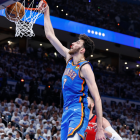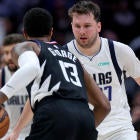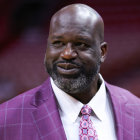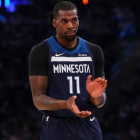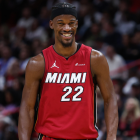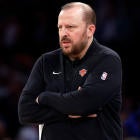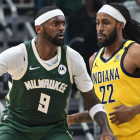This week, CBSSports.com's three-part series on nutrition in the NBA will explore players from Dwight Howard and Derrick Rose to Blake Griffin and Ray Allen who've adopted similar nutritional approaches to achieve a variety of goals.
'From worse than pet food to actual food'
Dr. Cate Shanahan was watching Dwight Howard play for the Lakers last season, and she was frightened by what she saw.
The Napa Valley doctor and nutritionist had no stake in whether Howard would re-sign with the Lakers; that was the least of her concerns. In conversations with the Lakers about spearheading a drastic change in their nutritional program for players, Shanahan believed she had the found the ultimate test subject in Howard.
"It looked like he was wearing oven mitts out there," Shanahan said. "It reminded me of patients who have pre-diabetes and neurological problems because of how sugar impacts the nervous system. That's where I became really concerned."
Shanahan's husband and co-author, Luke, had sent a copy of their book, "Deep Nutrition," to the Lakers' longtime athletic trainer, Gary Vitti. Having been around professional athletes for decades, Vitti had seen a lot of pitches. But Shanahan's book resonated, with its scientific and practical approach to a traditional diet of real food. In the year since, the approach to eating has become the standard in the Lakers' locker room, at team hotels and on charter flights -- setting the tone for what could be a seismic shift in how athletes use food to not only fuel, but also medicate their multimillion-dollar bodies.
"We're making the shift from basically worse than pet food to actual food," Cate Shanahan said.
When Shanahan was introduced to Howard last season, the All-Star center was having a miserable season with the Lakers and going down a terrible path with his diet. Shanahan couldn't have found a more high-profile test case for her beliefs. If food can improve or damage your genetic code, as her research had shown, then why couldn't it have the same impact on athletic performance?
"If you don't feel better in two weeks," Shanahan told Howard, "then I don't know what I'm talking about and I'll quit."
With Howard, the intervention began where it does with most athletes (and non-athletes, for that matter) who need to change their diets. It began with sugar. It turned out that Howard was consuming the equivalent of 24 Hershey bars a day in the form of candy and soda -- not to mention the additional sugar his body was making out of all the empty starches he was eating.
"We knew Dwight had a sugar-intake issue," said Luke Shanahan, whose Masters in Fine Arts from the world-renowned Iowa Writers Workshop has served him well in his role as the program's architect and co-pilot. "We just didn't know how bad it was."
It was bad. At Cate Shanahan's request, Howard had undergone a blood screening that revealed a frighteningly pathological profile. His glucose readings were through the roof, much higher than they should have been for a ripped, 27-year-old professional athlete who used to call himself Superman.
The Lakers arranged for Shanahan to meet with Howard, his personal assistants and chef. It wasn't unlike the kind of sitdown you might have with a loved one who's going down an unhealthy path.
"It was absolutely like a family intervention," Cate Shanahan said.
Howard was struggling to return to form after back surgery the previous spring, and was wrestling with the enormous pressure of whether to re-sign with the Lakers as a free agent. Cate Shanahan believed his performance and recovery were being seriously compromised by his poor diet. She saw the telltale signs of sugar addiction -- spikes in energy followed by crashes and erratic motor skills that were indicative of nerves misfiring.
"I said, 'I can't live this way because it's not healthy to have this high level of sugar in me,' " Howard said. "I just made a commitment."
Like an addict, Howard had candy and sugary drinks stashed everywhere -- from his kitchen cabinets to a drawer next to his bed to the backpack he toted to games and practices. He agreed to get rid of it all and start over.
But his dietary transformation, and that of the Lakers, didn't stop there. At Shanahan's behest, they avoid sugar, processed foods and unhealthy oils – vegetable, canola, corn and other chemically engineered cocktails. It's more nuanced than that, and Shanahan has sold the Lakers on the science to back it up.
"She's not pushing supplements on us," Lakers point guard Steve Nash said. "It's all natural foods. There's nothing processed; nothing unnatural. ... Although it is a bit of an extreme diet compared to the traditional diet, what works in its favor as far as a safeguard is that it is a natural diet."
Nash believes the infusion of healthy fats and oils helped him recover from a broken leg last season, and he's holding out hope for any edge he can find as he tries to overcome residual nerve damage from that injury this season. Other players report that their joints aren't as sore and their muscle recovery is better, like Steve Blake, who says his knees haven't felt this good since he played for the University of Maryland.
"If you really stick to it, it really makes a difference," Blake said. "Everything they're telling us, one, it makes sense, and two, [Shanahan] has science to back it up."
Chris Kaman, Shawne Williams, Jodie Meeks, Robert Sacre and even the eccentric Nick Young are among the Lakers who are all in. Others, like Jordan Hill, initially were skeptical but are coming around. Kobe Bryant, who returned Sunday after an eight-month recovery from Achilles' tendon surgery, has adopted some aspects of the diet that he believes promote healing.
"It's a different philosophy," Bryant said. "It's something that we all had to adjust to, but we trust Dr. Cate implicitly. I've seen great results from it from when I started doing it last year -- watching your sugar intake, making sure you're eating healthy fats. You've got to find a balance in that system. It's worked well for me."
The Lakers' program is called PRO Nutrition, which somewhat obtusely stands for Performance, Recovery and Orthogenesis -- the latter being the theory that evolution is strongly influenced by environmental factors, such as diet. It seems extreme because it has basically turned the government's sacred food pyramid upside-down. Shanahan wants the players to get at least 50 percent of their calories from fat, and no more than 25 percent each from protein and carbohydrates. Wait, what? That's right. Basically the opposite of what you and everyone else alive have been doing for years.
Oops.
"We're a country running on empty sugar, processed foods and vegetable oils," Luke Shanahan said. "... The first step is to get vegetable oils out of your life and replace empty starches with nutrient-dense food."
The percentages vary from player to player based on specific needs. For example, Williams was 20-25 pounds overweight when the Lakers signed him in September, so his regimen called for fewer carbs and more fat and protein. That's right, more fat. Since starting the program three weeks before training camp, Williams has lost 20 pounds while doubling his fat intake. Gone are the sugary drinks, cereals and processed grains. Gone, too, is his old wardrobe.
"All the clothes I brought with me are too big," Williams said.
Spreading the grass-fed gospel
Kaman has tried just about every diet known to mankind -- low-carb, high-carb, low-fat, high-fat, low-sugar, no-sugar and everything in between. But what's really grabbed him about the Lakers' program is that the source of the food is at least as important as what kind of food it is. Moreso, actually.
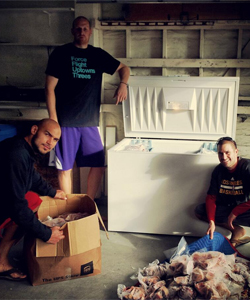
"For thousands of years before we had these chemicals and preservatives and processed foods, everything was fresh," said Kaman, a hunting enthusiast. "You cut it down and you ate it, or you killed it and you ate it or wrung its neck and you ate it. It's the most basic form of eating and I think that's the best way to eat."
When the protein and fat come from beef, it can't just be any beef; you'll only find beef from humanely raised, grass-fed cows with no added antibiotics on the Lakers' menu. (Grass-fed cows produce meat with higher levels of healthy omega-3 fatty acids.) The fish is wild, not farm-raised, which limits toxins. All other protein is from humanely raised sources, such as free-range chickens and pigs that have not been fattened on corn or other grains and have not been sickened and mass-engineered with antibiotics or hormones.
"There's a right way to raise a pig and a wrong way," Lakers strength and conditioning coach Tim DiFrancesco said. "Pigs that are raised with hormones and fed corn and grains, yeah, that'll kill you."
Shanahan wants her patients -- and, the Lakers are her patients, for lack of a better term --to stop thinking about food as fuel and start thinking of it as medicine. Think about it, too, as a chef would.
"If it has zero flavor," Shanahan said, "that's a really bad sign."
Vitti, in his 29th season as the Lakers' head athletic trainer, had the clout to get the program green-lighted. But it wouldn't have happened without DiFrancesco, a 32-year-old descendant of New England dairy farmers who was appropriately dubbed "Grass-Fed Tim" last season by Metta World Peace.
"I could look out my window if I was visiting my grandfather and see cows eating grass as we were drinking milk at the table," DiFrancesco said. "I didn't think anything of it. I just thought this must be what everybody does."
If Cate Shanahan provided the brains (board-certified physician, studied biochemistry and genetics at Cornell University), then DiFrancesco served as her eyes and ears on the ground. After a stint as head athletic trainer for the Bakersfield Jam of the D-League, DiFrancesco joined the Lakers when the 2011 lockout ended. He stepped away from the fitness training business he'd been running with his brother in Salem, Mass., with the hope that he could spread his grass-fed gospel to the big leagues.
What DiFrancesco saw on buffet spreads provided by NBA teams and in refrigerators from the practice facility to the arena during his early trips around the NBA stunned him.
"I was really shocked and amazed what the typical NBA player was getting educated on -- the right things to do nutritionally and the right things to do training-wise," DiFrancesco said. "I was really surprised when I entered into the league at what they were being told."
In addition to the preponderance of chicken fingers, burgers, fries, chips, pizza and sugary drinks, DiFrancesco saw that even well-meaning efforts to clean up players' diets were falling short.
"There's this fear that if an athlete doesn't get enough carbs, he might keel over and die," DiFrancesco said. "He might get to first quarter and drop dead if didn't eat enough pasta the day before. I was seeing sugar and a lack of fear of sugar, when it should be the opposite. They need to embrace fat -- good fat -- and fear sugar like it's going to kill us, because it is doing that before our eyes."
Getting back to being Superman
Howard has become such a believer that he's continued to follow the program in Houston and has even gotten the Rockets to implement some of it. For one thing, there's no more candy or sweets on the Rockets' team flights. GM Daryl Morey and longtime athletic trainer Keith Jones have even followed the Lakers' lead and made a catering deal with Whole Foods for road trips.
"We had to make that change, and I should've pushed harder earlier," Morey said. "With Dwight coming, I think it made it that much easier to make sure we got it done."
Howard's new teammates' response?
"They think I'm crazy," Howard said. "... But you've got to start doing little things now that will prolong your career.'"
Within weeks of starting the program, Howard said his blood-glucose levels declined 80 percent. After increasing his consumption of healthy fats and decreasing processed carbs -- "No bread," Howard said -- all the blood markers that are indicative of heart health went in the right direction, too. After some initial lethargy during the detox phase, Howard said his endurance improved and his energy levels became more consistent. His body-fat percentage -- hovering around 5-6 percent his entire career -- dropped to 3 percent, he said.
"I would always tell [the Lakers] how bad I wanted to get back to being Superman," Howard said. "Their response was, 'Well, you have to sacrifice something.' "
Since Howard left LA, the Lakers' program has gotten even more sophisticated -- and has gathered more support in the locker room. On the road, DiFrancesco used to take cab rides from the team hotel to the nearest Whole Foods and stock up on healthy prepared meals, as well as naturally fermented items such as pickles and Kombucha, a raw tea rich in anti-oxidants and probiotics that several players now drink instead of soda. Now, Whole Foods caters every Lakers chartered flight and road trip, right down to the uncured meats and raw cheeses for charcuterie plates that sit on a table in the locker room before games.
"The most surprising thing to me," Williams said, "is that the food still tastes good."
Vitti said the diet reminded him of the Mediterranean roots, when his mother always had a soup bone and a boiling pot on the stove.
"Everyone that writes a sports nutrition book seems to think it is a must-read," Vitti said. "But when I received Dr. Cate's, it was drastically different and very close to the way I grew up. ... My parents are from Italy, 92 years old and in great health."
Whereas most trainers travel with a suitcase loaded with pills and powders, DiFrancesco has replaced most of those with real food. His luggage is stocked with raw nuts, squeezable packs of hazelnut butter, kale chips, grass-fed beef jerky and more. He's not just a strength coach; he's an organic Sherpa, personal shopper and a consultant to players' wives, girlfriends and personal chefs about how to prepare healthy food at home.
"What my real title is -- strength and conditioning coach -- becomes way more effective when you can combine eating the right foods, the right fuel and food as medicine with training the right way," DiFrancesco said.
Buying in
On his Twitter account, DiFrancesco posts photos of Lakers players filling up their grocery carts with healthy snacks as well as massive amounts of grass-fed beef and humanely raised pork that he and some players have ordered from sustainable farms. Kaman, Sacre and DiFrancesco still have freezers full of meat from a 400-pound grass-fed cow they ordered from a San Diego butcher in October.
For every road trip, Shanahan will study the room service and hotel restaurant menus and color-code items so the players know what to avoid. Some hotels make substitute items available – such as cooking meals in olive oil instead of partially hydrogenated oils that promote inflammation and disease while hindering recovery, she said.
When the players are eating at home, no part of the animal goes unused. Shanahan and DiFrancesco have advised the players' food preparers on how to make tasty dishes out of nutrient-dense organ meat (Nash and Kaman love liver pate) as well as soups and stews with broth simmered in bone marrow, which Shanahan says promotes healing and joint health. That's the part of the diet that Bryant has thoroughly embraced, though he's been more cautious about other aspects.
"He felt a difference immediately in his joints," DiFrancesco said. "He's excellent when it comes to making sure that every meal, he's getting some of this liquid-gold bone broth. ... It's comfort food."
Like Bryant, other players haven't bought in 100 percent.
"Some guys say they're on it," Kaman said, "but I don't know how serious they are."
Hill, one of the holdouts, has become more interested. He's scheduled a grocery trip with DiFrancesco this week in LA before the team embarks on a road trip.
"Baby steps," Cate Shanahan said.
Organ meats and bone-based broths are among the four "food pillars" that Shanahan has identified, along with fermented or sprouted food and raw, full-fat unpasteurized dairy. It's the way DiFrancesco was raised to eat -- and Shanahan would argue, the way much healthier populations ate for hundreds of years before the American diet became the processed, toxic mess that it is now.
Not only are the Lakers unafraid of healthy fats, they practically freebase them. The pregame beverage of choice is something the players call "bullet-proof coffee" -- coffee seasoned with two teaspoons of pastured butter and heavy, grass-fed cream.
"The caffeine dilates your blood vessels and delivers the fat to the brain," Kaman said. "It's good."
So it begs the question: All of this work, time, commitment and sacrifice ... for what? Where is the evidence that eating this way -- for athletes or anyone else -- makes a difference? Where is the evidence that all this fat is OK?
"I'm going to eat this way until I die," Kaman said. "As long as I don't have a heart attack from all the butter I'm taking in."
For the long haul
Shanahan explores the chemistry, genetics and anthropology behind the approach in painstaking detail in her book and in resources and new studies she's constantly posting on social media. But like anything else on social media, the nutrition community tends to be an echo chamber -- similar voices and viewpoints forever bouncing off each other, seeming to confirm some unalienable truths without having to be bothered with the inconvenience of dissenting opinions.
"There's no hard-core evidence that this stuff helps; there really isn't," said Morey, who has been on the cutting edge of using advanced statistics and analytics to guide every basketball decision he makes. "So if a player were to challenge me, I'd be honest with him. That said, there's a lot of directional studies that absolutely say it makes an impact. ... We just feel strongly that even though the science is a little early on it, this can help."
After years of health authorities telling us to eat low-fat, high-carb diets, there's a movement afoot suggesting that it's actually the processed carbs and sugars that are causing disease – not the fats, as long as the fats are from quality sources.
Last month, the Food and Drug Administration woke up from decades of slumber and issued a ruling that would all but eliminate trans fats -- predominant in the partially hydrogenated oils that the Lakers have eliminated from their menu -- from the food supply. It remains to be seen whether the mass-producers of the food industry will replace trans fat with something that's better or worse for us.
In October, Sweden became the first Western nation to establish nutritional guidelines that reject a high-carb, low-fat diet after the Swedish health council pooled the results of 16,000 studies on the causes of heart disease and diabetes and found no link to saturated fats --and instead, found links to sugar and high-carb diets.
Scientific studies come and go, and many of them have been wrong. For the purposes of this story, all we have are the anecdotal results of some professional athletes who've tried a new (or old) way of eating.
"I've definitely noticed my joints aren't as sore, aren't as stiff when I wake up when I don't eat the bad oils," Kaman said.
During a recent interview on a Lakers road trip, Kaman dug through his backpack and pulled out some kale chips and hazelnut butter, which he keeps with him at all times for snacking. He said his sustained energy has improved, and his body-fat percentage has gone from about 15 percent to 13 percent. He's taken the no-sugar mantra to another level, avoiding fruits, which are high in fructose.
"I'd say 85 to 90 percent of guys [in the NBA] aren't committed to their bodies," Kaman said. "They don't care because they're already built to where they look good. They're a freak show, they're ripped, they're lean and they can jump high, so they don't care. I'm at the other end of the spectrum."
Howard, the kind of nutritionally ambivalent, freakish physical specimen Kaman is referring to, knows better now.
"I can tell once I've had something bad, my body feels different," Howard said.
Howard's new boss, Morey, is grateful for the changes, but isn't relying on them to make a difference in the standings.
"I add it to the list of a lot of things we do because we think it helps, but I'm not counting on it," Morey said. "If someone heard this story about us changing our diet, no person should run out and bet on us in Vegas."
Whatever happens as far as wins and losses, the Lakers have been sold on some other numbers linked to the program. When DiFrancesco shared the players' bloodwork and body-fat changes with Mitch Kupchak last season after a few weeks on the new diet, the Lakers' GM was floored.
"Mitch said, 'How can this guy have made those body-composition changes that fast? How can this have happened?'" DiFrancesco said.
And just as Howard has taken the diet with him to his new team, DiFrancesco hopes players stick with it for life.
"We are doing this for you as a 50-, 60-, 70-year-old," he said. "This is for your health as a human being. It's going to help you as a Laker, but it's more than that. ... Once you put all that on the table, it's hard to walk away and not feel good about it."







